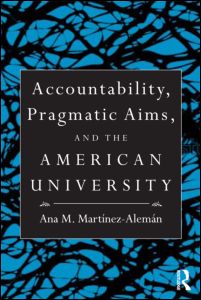HETL Note: We are pleased to present the first book review to be published in the 2013 regular issue of the International HETL Review (IHR), This book review is an in depth examination of Ana M. Martinez Alemán’s scholarly analysis of the call for accountability in U.S. research universities. The review introduces the book to the reader following the author’s argument as it develops in the sequence of the book chapters. Pamela R. Mathews highlights the major contributions of the book such as the discussion on the significance of John Dewey’ s historic contributions to establishing standards for university governance and administration, and the critical analysis of the rising culture of managerialsim and its implications. Critiquing some of the author’s views the reviewer puts forward an argument about responsibility as an important aspect of accountability. Overall, the review convincingly presents the book as a meaningful study that examines current trends in higher education such as university corporatization, through the prism of American university history.
 Bio: Pamela R. Matthews is Vice Provost for Academic Affairs and Professor of English at Texas A&M University. Prior administrative positions include Associate Provost for Undergraduate Studies, Associate Dean for Undergraduate Programs in the College of Liberal Arts, Associate Head of the Department of English, and Director of Women’s Studies (now Women’s and Gender Studies), all at Texas A&M University Professor Matthews received her Ph.D. in English (1988) with a specialization in American literature from Duke University. Her scholarly publications include Ellen Glasgow and a Woman’s Traditions (1994), Aesthetic Subjects (coedited with David McWhirter, 2003), and Perfect Companionship: Ellen Glasgow’s Selected Correspondence with Women (2005). Professor Matthews’ portfolio includes institutional effectiveness, academic assessment, accreditation, and support for high-impact educational practices. She has received recognitions for teaching, including a Robert M. Gates Inspiration Award in recognition of her work with undergraduate first-generation Regents’ Scholars (2008). Professor Matthews can be contacted at [email protected].
Bio: Pamela R. Matthews is Vice Provost for Academic Affairs and Professor of English at Texas A&M University. Prior administrative positions include Associate Provost for Undergraduate Studies, Associate Dean for Undergraduate Programs in the College of Liberal Arts, Associate Head of the Department of English, and Director of Women’s Studies (now Women’s and Gender Studies), all at Texas A&M University Professor Matthews received her Ph.D. in English (1988) with a specialization in American literature from Duke University. Her scholarly publications include Ellen Glasgow and a Woman’s Traditions (1994), Aesthetic Subjects (coedited with David McWhirter, 2003), and Perfect Companionship: Ellen Glasgow’s Selected Correspondence with Women (2005). Professor Matthews’ portfolio includes institutional effectiveness, academic assessment, accreditation, and support for high-impact educational practices. She has received recognitions for teaching, including a Robert M. Gates Inspiration Award in recognition of her work with undergraduate first-generation Regents’ Scholars (2008). Professor Matthews can be contacted at [email protected].
Krassie Petrova and Patrick Blessinger
~~~~~~~~~~~~~~~~~~~~~~~~~
Review of Ana M. Martinez Alemán’s “Accountability, Pragmatic Aims, and the American University” (2012, Routledge)
Pamela R. Matthews
Texas A & M University, U.S.A.
 Readers may find it heartening or discouraging or both to read how long American universities have existed within a climate that sets up expectations for individual and social improvement but at the same time pits faculty against administrators, teaching against research, and academe against the rest of the world. Against the backdrop of rapid growth in universities and within the context of John Dewey’s pragmatic philosophy and its influence on American higher education, Ana M. Martínez Alemán’s scholarly study, Accountability, Pragmatic Aims, and the American University (New York, NY: Routledge, 2012), examines current calls for accountability in U.S. research universities and considers the effects of those calls on institutions and the people in them. Often through historical analyses of periods and events that have been transformative in American higher education over the past century, Martínez Aleman’s topics range from the democratic aims of a college education to faculty governance to current undergraduate education, all placed in tension with accountability as we understand that term today. Although I do not find all of the arguments unfailingly persuasive, this is an important, timely, well-researched, and thought-provoking book worthy of serious consideration.
Readers may find it heartening or discouraging or both to read how long American universities have existed within a climate that sets up expectations for individual and social improvement but at the same time pits faculty against administrators, teaching against research, and academe against the rest of the world. Against the backdrop of rapid growth in universities and within the context of John Dewey’s pragmatic philosophy and its influence on American higher education, Ana M. Martínez Alemán’s scholarly study, Accountability, Pragmatic Aims, and the American University (New York, NY: Routledge, 2012), examines current calls for accountability in U.S. research universities and considers the effects of those calls on institutions and the people in them. Often through historical analyses of periods and events that have been transformative in American higher education over the past century, Martínez Aleman’s topics range from the democratic aims of a college education to faculty governance to current undergraduate education, all placed in tension with accountability as we understand that term today. Although I do not find all of the arguments unfailingly persuasive, this is an important, timely, well-researched, and thought-provoking book worthy of serious consideration.
One of Martínez Alemán’s central premises is that the increasing corporatization of universities—a phenomenon that the author also calls ‘managerialism’—has undermined and continues to undermine the democratic goals of higher education in the U.S. From the beginning, she argues (and probably few would quibble), “the liberal principle of positive freedom (autonomy) has been positioned against negative freedom (external restraint and coercion) as the historic struggle in American democratic society” (p. 14). According to Martínez Alemán, around the turn into the twentieth century, Pragmatism as a philosophical perspective that joins education and experience and promulgates self-fashioning began to help reshape colleges. Colleges in turn increasingly focused on public service and scientific advancement and also became, therefore, less autonomous because more dependent upon external forces.
As the chapter titles and subjects following an introduction that sets the context indicate, the book’s organization is basically chronological. Martínez Alemán makes a case for linear arguments about where we have been, where we are now, and where we are or should be going in higher education: “The American University’s Democratic Aims,” “The Academic Profession Transforms,” “Teaching in the Managed University,” “The Rise of Managerialism,” “The Legacy of the Transformative Era,” and “Epilogue: Pragmatic Sensibility and Resolutions.” Martínez Alemán begins with the assumption that democratic goals and liberal principles were foundational assumptions in American higher education. Colonial values of “liberty, individuality, and freedom of inquiry, discussion, and speech” influenced the academic principles and curricula of the earliest colleges’ (p. 16). By the time of the Morrill Acts in 1862 and 1890 that established land-grant institutions of higher learning, Martínez Alemán argues, “autonomy and individual freedom as an (sic) unimpeachable value [were] central to American liberal consciousness” (p. 16) and thus inseparable from the purpose of a college education. By adding a populist belief in a more expansive and inclusive view of those who should be served by higher education, classical liberal educational principles were married to Pragmatic democratic notions of learning by doing.
Greater expansiveness and inclusion led not only to more democratic access to higher education—a discussion that persists today—but also to clearer ties between universities as producers of knowledge and as contributors to economic growth. Martínez Alemán argues that this more egalitarian (democratic) attitude toward higher education, along with its connection to economic vitality, resulted in “greater intrusion by the government and new forms of oversight” (p. 19). Enter John Dewey, the philosopher-educator-psychologist whose beliefs in unified knowledge that combined theory and practice became influential in American higher education. Rather than seeing only opposition, Dewey saw the compatibility between “liberal freedoms and certain forms of social control” (p. 21; see note i). The rise of science and the growth of universities within the context of higher education’s responsibility to serve democratic aims, Martínez Alemán argues, helped create universities as the sites of knowledge experts who thus contributed to both private good and public benefit during the “Transformative Era” in U.S. higher education from 1870-1944.
One of the strongest contributions made by Accountability, Pragmatic Aims, and the American University is its consideration of Dewey not primarily as the reconciler of learning (or knowing or theory) and doing (or experiencing or practicing) but as the founding president of the American Association of University Professors (AAUP) in 1915. Noting in his early speeches to the AAUP the need for the modern (i.e., early twentieth-century) university to construct the guiding principles it lacked in the face of rapid changes since its nineteenth-century beginnings solidified it as an American institution, Dewey observed that faculty and administrators needed to engage in “democratic communication or ‘shared governance’” (p. 42). In a phrase that will bring a smile to some, Dewey decried the “carping criticism of boards of trustees” ( p. 42) and, in a pivotal strategy, positioned the faculty as self-regulating through peer review, dedicated to a “common vocation” and “calling,” resistant to motivation for “selfish or monetary reasons,” and in need of a national professional association to, in Martínez Alemán’s words, “communicate [the faculty’s] very identity to the public in order to strengthen its position with trustees and presidents” (pp. 42-43), as well as to “develop standards for the profession” that would be monitored by the members of the professoriate (p. 43). As Martínez Alemán puts it, the “freedom to engage in inquiry, to determine curriculum and make pedagogic decisions, and to communicate as professionals or experts were freedoms necessary for this profession” (p. 43), according to Dewey. Dewey matched his characterization of the “carping” trustees with an equally derogatory characterization of the faculty as “intrinsically querulous and cranky” (p. 45). The AAUP and the foundational “1915 Declaration of Principles on Academic Freedom and Academic Tenure” developed under Dewey’s guidance were intended primarily as vehicles for communicating the importance of free inquiry in the service of knowledge that contributes to the public good.
Martínez Alemán makes an important addition to the literature of higher education in Chapter 5 in which she discusses the “rise of managerialism” and its effects on universities. Two parallel or “interconnected developments” in universities during the late nineteenth and early twentieth centuries were growth and increased specialization on the part of faculty. With specialized professorial knowledge came “a zealous autonomy that bred administrative distrust and public suspicion”; with rapid growth came more scrutiny of faculty and their research by entrepreneurs, legislators, and other members of the public, Martínez Alemán argues (p. 48). Dewey worried that faculty immersion in what he thought of as overspecialized research took them away from their “vocational identity” as teachers and thus had the potential to undermine the liberal educational principles in the service of democracy that traditionally had characterized universities. Specialization also encouraged and was encouraged by other important developments: graduate education, disciplinary rather than institutional identification, and an emphasis on research over teaching, Martínez Alemán argues. Federal funding of faculty research (particularly scientific research) increased, along with competition for the prestige such funding brought. Scholarly journals were formed, and as early as 1926, I was surprised to learn, there were discussions of faculty split between permanent and temporary appointments. Increasingly intense competitiveness, Martínez Alemán implies, gave rise to the corporate, managerial culture in the roots of which she traces to the Transformative Era. All of these historical developments result in what Martínez Alemán identifies as “our 21st-century tribulations in the university—privatization, corporatization, and accountability” (p. 85). Her epilogue is an inspiring discussion—one of the strongest sections of the book, in my opinion—of the “art” of teaching (p. 111), and the importance of “democratic imperatives constitutive of the mission of the university and the identity of the faculty” (p. 109).
I wish that the book had had one additional thorough editing and proofreading. There are too many minor but distracting problems, such as obvious typographical errors, that should have been caught by a copy editor. More significant are flaws that interfere with reading—and sometimes even comprehension—and that might have been corrected with one more careful reading: sentences that do not scan, omitted or misused words, variations in spelling (including a discrepancy in the spelling of the author’s name, which is hyphenated on the book’s cover but unhyphenated elsewhere in the book), and at least one misidentification of an important early academic and contemporary of Dewey’s, Arthur O. (not T.) Lovejoy.
For the most part, however, these problems are minor irritants. A more serious reservation is philosophical and concerns an occasional tendency in this book toward binary oppositions. I am a little skittish about wholesale assumptions that “accountability” is necessarily bad, although that is by no means an unqualified endorsement of the current trend that Martínez Alemán correctly discerns. However, one important synonym for accountability is “responsibility,” for example, so it may be more productive for higher education today to approach calls for accountability with alternate interpretations of what that means than to dig in our collective heels. Almost any issue in the modern university setting (or the historical one, for that matter, as Martínez Alemán demonstrates) is a negotiation within a complex cultural, social, and educational system of multiple interests. “Us” versus “them” seems at best unproductive or distracting, at worst self-destructive. Overall, however, despite these quibbles, Accountability, Pragmatic Aims, and the American University is an important book that contributes thoughtfully and productively to an understanding of the historical roots of contemporary higher education. Like Martínez Alemán, I think it is crucial to understand the sources of our current assumptions and practices, and she has provided those of us who work in higher education with rich material for contemplation and action.
Notes
(i) The direct quotes from Dewey’s work included in the text appear as provided by the author of the book, on the pages indicated in round brackets.
This invited book review was prepared for publication by Dr. R. Martin Reardon, Virginia Commonwealth University, Richmond, Virginia, U.S.A., member of the Editorial Board of the International HETL Review (IHR).
Suggested Citation
Matthews, P. R. (2013). Review of Ana M. Martínez Alemán’s, “Accountability, Pragmatic Aims, and the American University.” The International HETL Review. Volume 3, Article 4, https://www.hetl.org/book-review-articles/review-of-ana-m-martinez-alemans-accountability-pragmatic-aims-and-the-american-university
Copyright © [2013] Pamela R. Matthews
The author(s) assert their right to be named as the sole author(s) of this article and the right to be granted copyright privileges related to the article without infringing on any third-party rights including copyright. The author(s) retain their intellectual property rights related to the article. The author(s) assign to HETL Portal and to educational non-profit institutions a non-exclusive license to use this article for personal use and in courses of instruction provided that the article is used in full and this copyright statement is reproduced. The author(s) also grant a non-exclusive license to HETL Portal to publish this article in full on the World Wide Web (prime sites and mirrors) and in electronic and/or printed form within the HETL Review. Any other usage is prohibited without the express permission of the author(s).
Disclaimer
Opinions expressed in this article are those of the author, and as such do not necessarily represent the position(s) of other professionals or any institutions.




